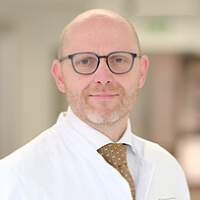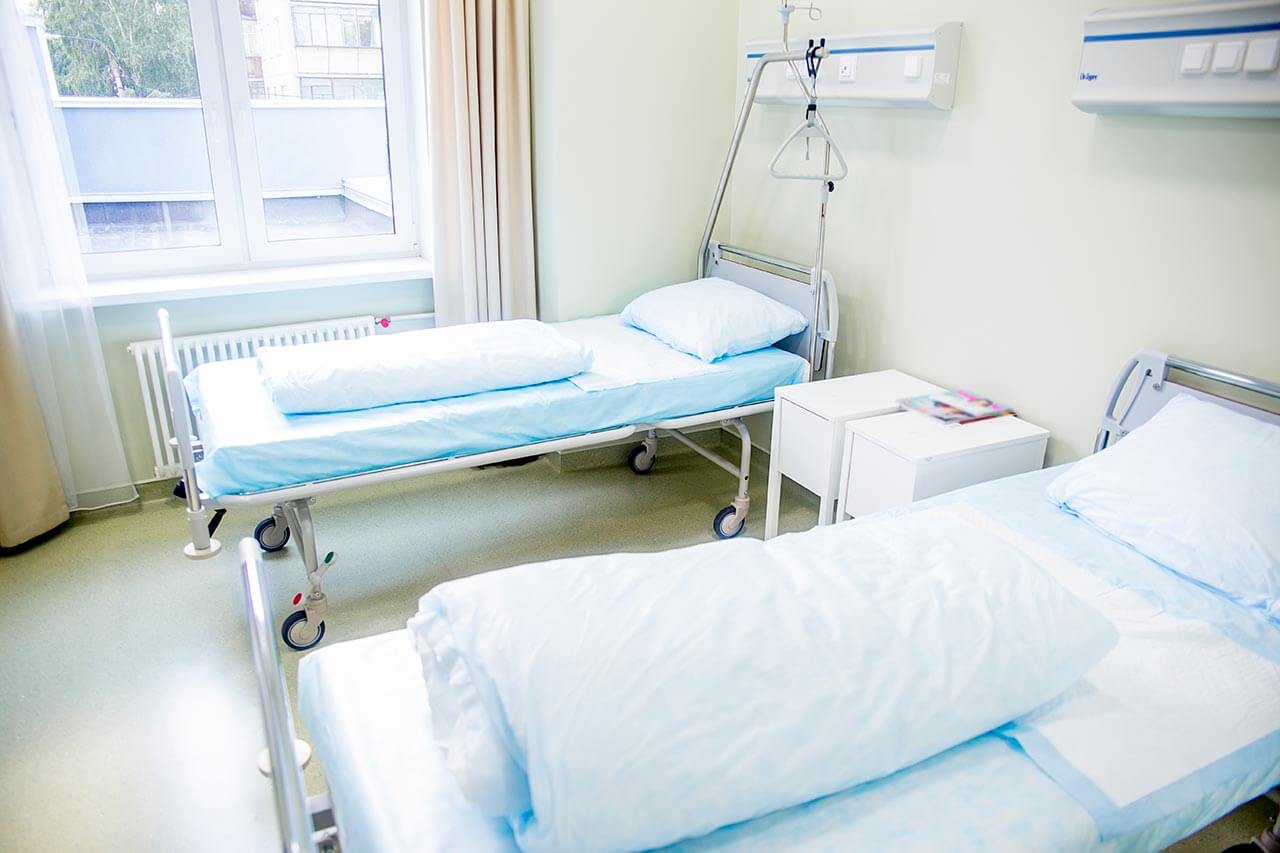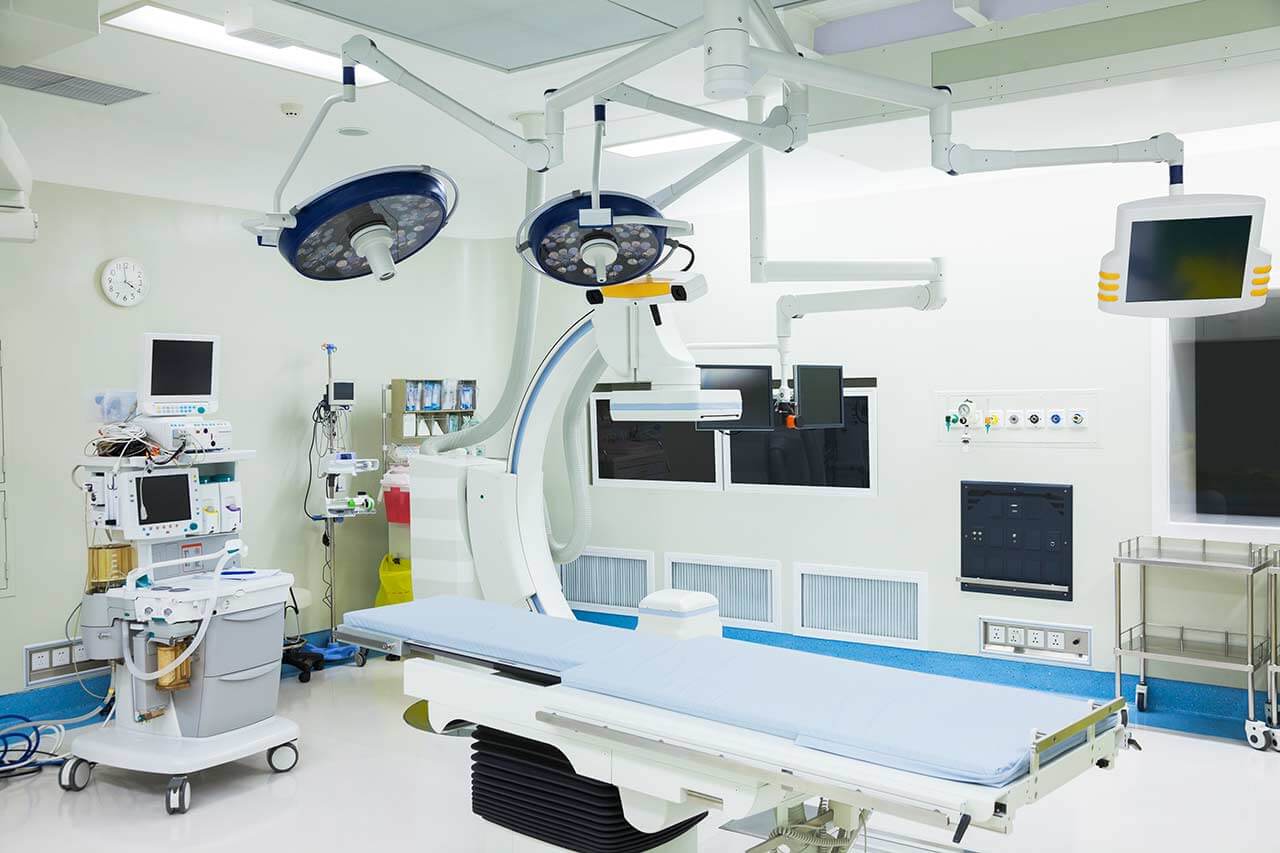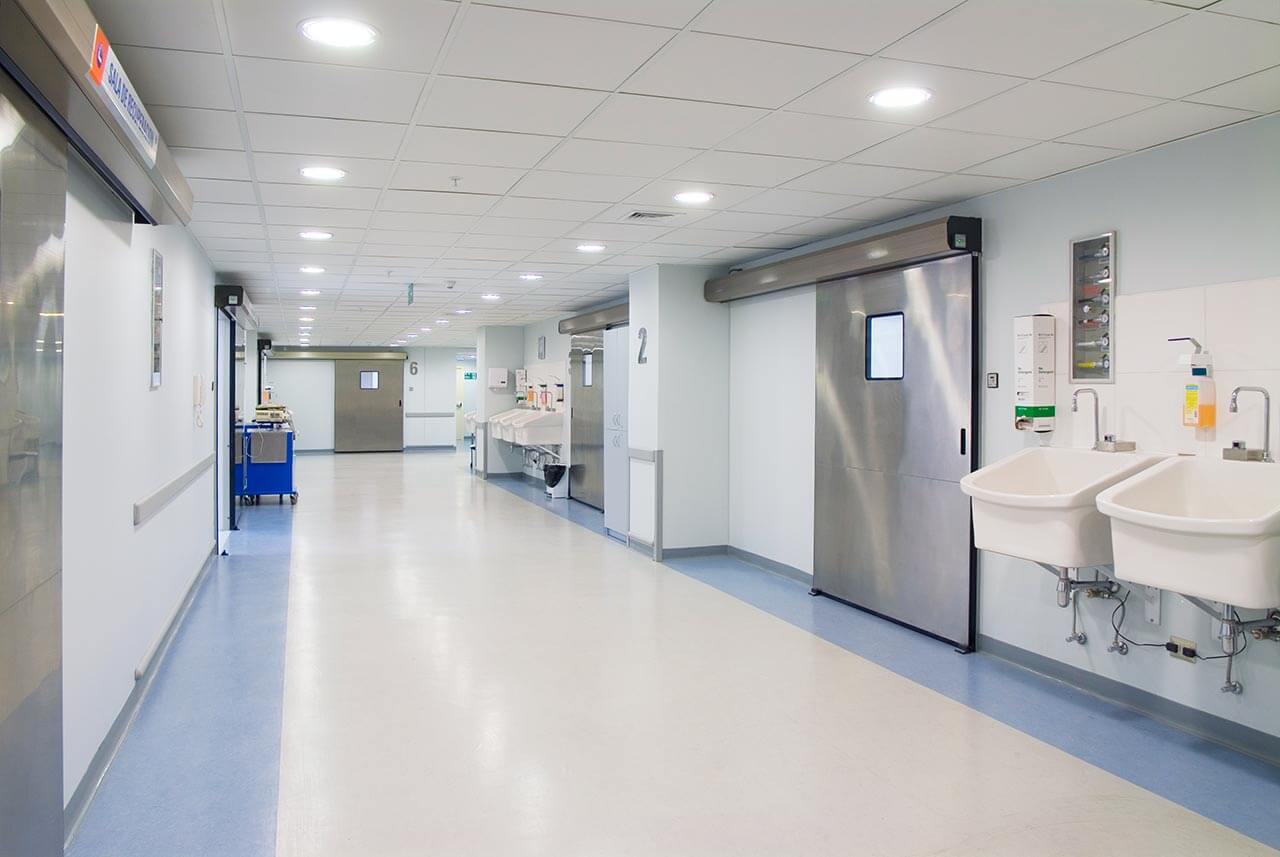
The program includes:
- Initial presentation in the clinic
- history taking
- general clinical examination
- abdominal ultrasound
- MRI scan (on indication 1200 €)
- nursing services
- consultation of related specialist
- development of individual treatment plan
- written statement
Required documents
- Medical records
Service
You may also book:
 BookingHealth Price from:
BookingHealth Price from:
About the department
The Department of General and Abdominal Surgery, Hernia Surgery, Hepatopancreatobiliary Surgery, Colorectal Surgery, Thoracic Surgery, Endocrine Surgery and Bariatric Surgery at the University Hospital Oldenburg offers a full range of surgical treatments for diseases of the intestine, stomach, esophagus, pancreas, liver, gallbladder, bile ducts, rectum, anus, thyroid gland, parathyroid glands, and adrenal glands. The department's surgeons are also skilled in inguinal, umbilical, femoral, and incisional hernia repair. An integral part of the department's daily clinical practice is the surgical treatment of diseases of organs in the chest: lung cancer, mediastinal tumors, chest wall tumors, pulmonary emphysema, myasthenia gravis, and pneumothorax. The medical facility also successfully performs bariatric surgery for morbid obesity. The department is part of the Robotic Surgery Center, which performs operations on the small intestine, rectum, stomach, and pancreas, as well as bariatric surgery using the innovative da Vinci robotic system. The department has been awarded the quality certificate by the German Cancer Society (DKG), which indicates outstanding success in the treatment of oncological diseases. Most surgical interventions are performed through a minimally invasive approach with minimal risks. The department's surgeons annually perform over 3,000 operations of varying complexity in inpatient and outpatient settings. The Head Physician of the department is Prof. Dr. med. Maximilian Bockhorn.
One of the main focuses of the department's surgeons is the treatment of malignant tumors of the small intestine, colon, and rectum. The specialists mainly treat colorectal cancer. A successful outcome requires a multidisciplinary approach, which is why gastroenterologists, oncologists, and radiotherapists are involved in the therapeutic process. At the diagnostic stage, the patient undergoes colonoscopy with biopsy and histologic examination of the biopsy material, followed by CT and/or MRI for treatment planning. A treatment plan for a patient with colorectal cancer is developed in an interdisciplinary tumor board, where physicians study the diagnostic data and select the most effective set of therapeutic measures. The surgeons of the department are responsible for the resection of a malignant tumor (in advanced stages, resection of the affected portion of the intestine with subsequent anastomosis may be necessary). The department performs surgical procedures for colorectal cancer using minimally invasive techniques. If clinically indicated, surgery can also be performed using the da Vinci robotic device.
The department's team of surgeons has excellent expertise in the surgical treatment of inflammatory bowel disease (IBD): Crohn's disease and ulcerative colitis. Each of these pathologies is potentially life-threatening and usually begins at a young age. Gastroenterologists are responsible for examining a patient with suspected Crohn's disease or ulcerative colitis. The specialists perform endoscopic examinations, imaging diagnostics, and laboratory tests. The first-line treatment is pharmacotherapy to relieve symptoms and prevent progression of the disease. In some cases, surgery may be necessary, such as for serious complications like intestinal perforation, recurrent gastrointestinal bleeding, or acute megacolon that does not respond to drug treatment. Surgery for IBD may also be indicated if drug treatment is ineffective or if a malignant process develops. Surgery for Crohn's disease and ulcerative colitis is performed using minimally invasive techniques with an emphasis on preserving bowel control.
In the field of hepatopancreatobiliary surgery, the department offers a full range of modern surgical procedures for diseases of the liver, gallbladder, and bile ducts. The most popular procedure is cholecystectomy, which is the removal of the gallbladder. This type of surgery is indicated for cholelithiasis, cholecystitis, and gallbladder tumors. Cholecystectomy is performed using minimally invasive techniques. The department's team of hepatopancreatobiliary surgeons are also competent in performing extensive liver surgery using minimally invasive techniques. The most common conditions requiring liver surgery are malignant liver tumors and metastases from tumors elsewhere. During surgery, the department's specialists use ICG fluorescence, which allows for maximum accuracy in identifying and removing pathological foci in the liver.
The department also provides thoracic surgery services. Specialists in this area operate on patients with diseases of the organs in the chest, with the exception of the heart. Of particular clinical interest are operations for lung cancer, mediastinal tumors, chest wall tumors, pulmonary emphysema, myasthenia, pneumothorax, and other pathologies. The department's thoracic surgeons primarily use video-assisted thoracoscopic surgery (VATS) techniques: 2-3 miniature skin incisions are made for a surgical approach, through which special thin instruments and a tiny video camera are inserted, transmitting images of the surgical field to the monitor.
The department also offers bariatric surgery to its patients. Bariatric surgery is used to help patients with morbid obesity lose weight when diet and exercise have not produced the desired results for 6 months or longer. An absolute indication for bariatric surgery is a body mass index of 50 kg/m², as the chances of losing weight with standard methods are minimal in this case. Gastric bypass and sleeve gastroplasty are the most popular bariatric procedures performed in the department. The optimal surgical procedure for each patient is determined based on body mass index, age, presence of comorbidities, individual preferences, and other factors. Bariatric surgery is performed using minimally invasive surgical techniques, so recovery in the postoperative period is extremely fast. After the surgery, qualified nutritionists, trainers, psychologists, and other specialists work with the patient, whose task is to develop a personalized diet, a set of physical exercises, and a drug treatment regimen to consolidate the results of the surgery.
The department's range of surgical services includes the following:
- General and abdominal surgery
- Surgery for stomach diseases with a special focus on stomach cancer treatment
- Surgery for esophageal diseases
- Surgery for gastroesophageal reflux disease
- Surgery for esophageal diverticulum
- Surgery for esophageal cancer
- Surgery for pancreatic diseases
- Surgery for pancreatic cancer
- Surgery for pancreatic cysts
- Surgery for acute and chronic pancreatitis
- Hernia repair surgery
- Surgery for inguinal hernia repair
- Surgery for umbilical hernia repair
- Surgery for femoral hernia repair
- Surgery for incisional hernia repair
- Hepatopancreatobiliary surgery
- Surgery for gallbladder cancer
- Surgery for cholelithiasis
- Surgery for cholecystitis
- Surgery for liver cancer and liver metastases
- Colorectal surgery
- Surgery for small and large intestine cancer
- Surgery for anorectal abscess
- Surgery for anal fistulas
- Surgery for anal fissures
- Surgery for hemorrhoids
- Thoracic surgery
- Surgery for lung, bronchial, tracheal, mediastinal, and chest wall malignancies
- Surgery for pulmonary emphysema
- Surgery for myasthenia gravis
- Surgery for pleurisy
- Surgery for interstitial lung disease
- Surgery for pneumothorax
- Endocrine surgery
- Surgery for thyroid diseases: thyroid nodules, diffuse toxic goiter, Hashimoto's thyroiditis, goiter, and thyroid cancer
- Surgery for parathyroid diseases: hyperparathyroidism and parathyroid cancer
- Surgery for adrenal tumors
- Surgery for neuroendocrine tumors
- Bariatric surgery
- Gastric bypass
- Sleeve gastrectomy
- Other medical services
Curriculum vitae
Prof. Maximilian Bockhorn studied medicine at the University of Tuebingen and the University of Hamburg. He received his doctorate in 1996. After completing his internship in the Department of General Surgery in 1998, he began his professional training in the Department of General, Abdominal and Transplant Surgery at the University Hospital Essen. From 2000 to 2002, Prof. Bockhorn conducted research in tumor biology at Harvard Medical School, Boston (USA). After he was board certified, he completed his habilitation. In 2007, he took up the position of Acting Head Physician of the department at the University Hospital Essen. In 2009, he became a Senior Physician and, in 2013, a Managing Senior Physician and Deputy Head Physician of the Department of General, Abdominal and Thoracic Surgery at the University Hospital Hamburg-Eppendorf. In 2012, he also completed his board certification in abdominal surgery and in 2016 in thoracic surgery. In 2019, Prof. Maximilian Bockhorn took up the position of Head Physician of the Department of General and Abdominal Surgery, Hernia Surgery, Hepatopancreatobiliary Surgery, Colorectal Surgery, Thoracic Surgery, Endocrine Surgery and Bariatric Surgery at the University Hospital Oldenburg.
Dr. Bockhorn's primary clinical focus is cancer surgery. He also specializes in minimally invasive surgery for liver, gallbladder, pancreatic, stomach, and esophageal tumors. His research focuses on the role of inflammation in tumor development and the development of resistance to chemotherapy.
Prof. Bockhorn is a member of various international societies such as the European-African Hepato-Pancreato-Biliary Association (E-AHPBA), the International Study Group for Pancreatic Surgery (ISGPS), and the European Surgical Association (ESA).
Photo of the doctor: (c) Klinikum Oldenburg AöR
About hospital
The University Hospital Oldenburg is a multidisciplinary medical complex offering top-notch services of the European standard. The hospital has 20 specialized departments, 15 highly specialized centers, and more than 10 institutes. The hospital provides services in almost all areas of modern medicine: general and abdominal surgery, cardiac surgery, orthopedics, traumatology, cardiology, oncology, dermatology, gastroenterology, gynecology, mammology, urology, and pediatric and adolescent medicine.
The hospital has 832 beds, and many diagnostic and therapeutic procedures are performed on an outpatient basis. More than 150,000 patients are treated here annually, 37,000 of them receive medical care in a hospital setting. The medical complex has a highly professional medical team of more than 2,900 employees and most departments are headed by professors with extensive clinical experience.
The hospital is home to one of the best comprehensive cancer centers in Germany (Nordwestdeutsches Tumorzentrum), certified according to the requirements of the German Cancer Society (DKG). The center successfully treats breast cancer, prostate cancer, colorectal cancer, pancreatic cancer, esophageal cancer, head and neck tumors, skin tumors, and other oncological diseases. The center uses modern cancer treatment methods with proven effectiveness and also offers allogeneic and autologous bone marrow transplantation for the treatment of severe hematologic diseases (European certification JACIE).
The University Hospital Oldenburg is an expert medical facility in robotic surgery. The hospital has a specialized da Vinci Surgery Center, where gastrointestinal, urological, and gynecological diseases are treated with excellence. Patients are operated on by highly qualified professors with in-depth expertise and extensive experience in robotic surgery.
The University Hospital Oldenburg is one of the leading medical institutions in Germany because it offers excellent medical and technical resources, qualified personnel, and a comfortable infrastructure designed with the needs of patients in mind. The hospital's physicians treat patients with complex clinical cases and achieve incredible results.
The basis of medical care in the hospital is humane attitude to the patient, empathy and understanding of his needs. During the therapeutic process, the patient is surrounded by care and, if necessary, receives professional psychological support.
Photo: (с) depositphotos
Accommodation in hospital
Patients rooms
The patients at the University Hospital Oldenburg stay in comfortable single, double, and triple rooms. Each patient room has an ensuite bathroom with a toilet and a shower. The patient rooms have a TV, a telephone, and Wi-Fi. The patient rooms in the pediatric departments are designed in an appropriate interior to make the young patients feel as comfortable as possible. A child can stay in the same room with one of the parents.
The hospital has an excellent infrastructure: there is a pharmacy, a hairdresser, an ATM, and a library with audio books, DVD movies, and board games.
Meals and Menus
The hospital offers delicious and balanced meals three times a day: breakfast, lunch, and dinner. Since 2022, a new menu "Vitalessen" has been introduced here, which excludes the addition of preservatives, dyes, and flavor enhancers to food. The menu takes into account all preferences and wishes of the patients.
There is also a cozy cafe in the hospital, where you can enjoy a tasty snack or a cup of aromatic coffee or hot tea with dessert.
Further details
Standard rooms include:
![]() Toilet
Toilet
![]() Shower
Shower
![]() Wi-Fi
Wi-Fi
![]() TV
TV
Religion
There is a chapel on the ground floor of the hospital where Catholic and Evangelical services are held regularly. Services by representatives of other religions are available upon request.
Accompanying person
Your accompanying person may stay with you in your patient room or at the hotel of your choice during the inpatient program.
Hotel
You may stay at the hotel of your choice during the outpatient program. Our managers will support you for selecting the best option.




